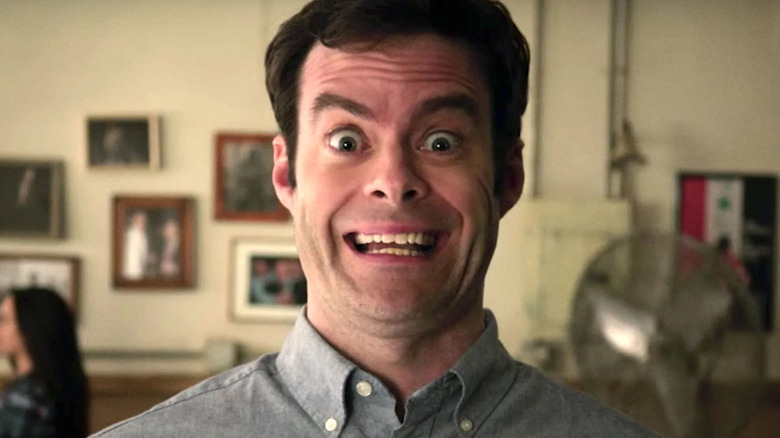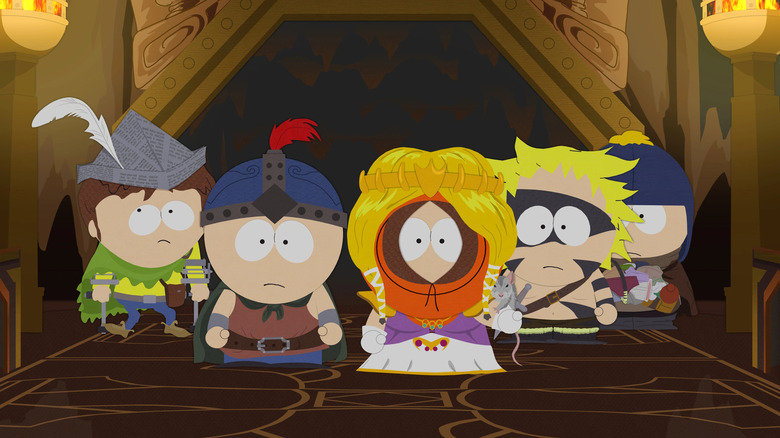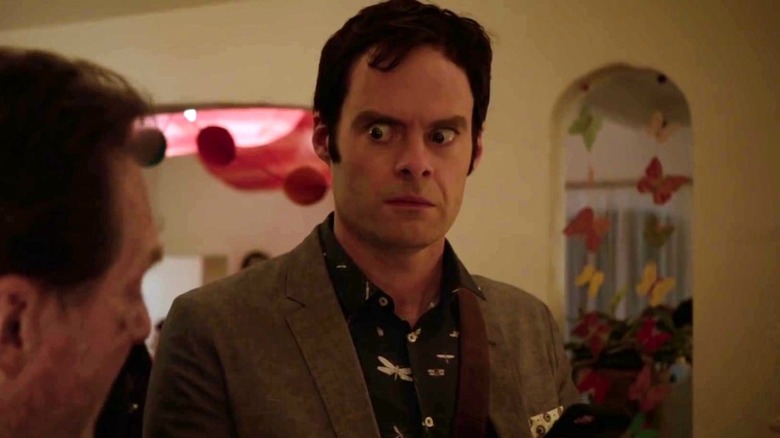The Unusual Path Bill Hader Took To The South Park Writers Room (And What He Learned There)
After he left "Saturday Night Live" and before he starred in his successful HBO show "Barry," Bill Hader found work as a full-time writer on "South Park," joining the show full-time in 2013. This wasn't his first time working on the show, however. The comedian originally met "South Park" co-creator Matt Stone at a party in Los Angeles while he was filming "Forgetting Sarah Marshall." The two became friends, and then Stone introduced Hader to co-creator Trey Parker and some of the show's other producers. After getting to know the team, they let him take part in the creative process, eventually culminating in his joining the writing team after he finished his "SNL" tenure.
Although Hader was busy with "SNL" at the time, he did get summers off to do other projects, where he managed to provide creative input for such memorable episodes like the "Fishsticks" episode, in which Kanye West goes on a murderous rampage because he doesn't understand a schoolyard joke being made about him.
According to Hader, Trey got excited in the writers' room when they realized nobody had ever made that dumb joke before. Trey asked, "Who's the one person in the world who doesn't have a sense of humor?" and in unison the rest of the writer's room said, "Kanye West," so they based a lot of the story around Kanye being told the joke and taking it way too seriously. The episode has a reputation outside of its fanbase precisely because Kanye West responded with apparent anger and confusion towards it. In an interview ten years later, Kanye West complained about the joke again in a way that seems to indicate the rapper thinks they were making fun of the way his legs looked in skinny jeans, which is very much not what the joke was about.
A good fit for an SNL alum
"Saturday Night Live" and "South Park" both have clear, strict production deadlines, the latter of which is chronicled in the TV documentary special "6 Days to Air," available to stream on HBO Max now. The week's worth of time between each episode allows both shows to touch on very recent real-world events, with the downside of making each feel a little rough-around-the-edges. "South Park's" crude, cheap animation style has become one of its charms, as it's what allows the show to be made so quickly. (Animation for "Rick and Morty," for instance, takes months.)
Bill Hader's experience working under this kind of time crunch made him a good fit for the team. Hader explained in the podcast "Working it Out" how it was important in these situations to not be afraid to have bad ideas or care about seeming stupid when it comes to the group brainstorming process. "You're gonna be wrong, so be wrong as fast you can." Both "SNL" and "South Park" have honed his ability to throw everything out there and see what sticks.
Another key writing lesson Hader attributes to his experience on "South Park" was his approach to causal storytelling. "Trey taught me, 'It's not this happened and this happened and this happened.' It's, 'This happened and therefore this happened, so therefore this happens.'" Every episode of "South Park" can be summed up by connecting each scene with a "so then," not an "and then."
So in an episode like "Awesome-O," Cartman is pretending to be a robot to pull a prank on Butters when he finds out Butters has an embarrassing video of him, so then Cartman has to continue pretending to be a robot, so then Butters unwittingly starts using him as his personal servant, so then Cartman is starving and thirsty because he can't get out of the robot costume, and so on. It's a far cry from the "Family Guy" format of, "Peter does X in the first act, and then he does Y in the second, then Z in the third," often with very little connection between the three.
Bringing the experience into Barry
This may seem like standard storytelling advice, but considering Bill Hader's previous gig was on a sketch show where every idea needed only a few minute's worth of plot, it was certainly helpful. Hader explained to Vulture, "When I got 'SNL,' I'd only been performing comedy for, like, a year and a half, so I had no f**king idea what I was doing. It was really like going from kindergarten to Harvard, and then I was just learning as much as I could from everybody." As absurd as it may seem on the surface, "South Park" proved itself a vital stepping stone on his path to starring in and producing his own hit show.
Another piece of advice he got from the "South Park" crew? Learning to prioritize the emotional journey of the characters. Hader said:
"That's another thing I've learned at the show is it's gotta be an emotional story. You hear Trey say that a lot. If we're telling a story that has to do with Cartman, and we're telling another story that's about Kyle, he's always saying, 'What's Cartman's emotional story here? He goes from this emotion to that emotion. What's Kyle's emotional story?' That's really what drives the thing. And then, it's going, 'Okay, what is emotional? What is our point, if there is one?”
Watching the recent season of "Barry," it's not difficult to see this same philosophy in action. Every episode has a clear emotional throughline for each character, even amongst all the jokes. Season 3's "limonada" wasn't just about Barry trying to figure out how to earn Cousineau's forgiveness, it was an emotional exploration of his declining mental state, with larger implications for the character beyond his immediate goal. Hader's career trajectory has been an unusual one, but with the success of "Barry," he's earned himself one of the best post-"SNL" careers we've seen in a long while, and his time on "South Park" was an important part of that.


